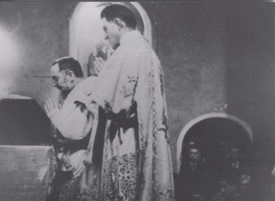Archbishop Mauro Piacenza looks briefly at this question and explores some key points of what a priest’s identity is. Watch the video clip.
Author: Paul Zalonski
Saint Pio of Pietrelcina
“…the legacy he left is holiness”
God our Father, in Saint Pio of Pietrelcina You gave a light to Your faithful people. You made him a pastor of the Church to feed Your sheep with his word and to teach them by his example. Help us by his prayers to keep the faith he taught and follow the way of life he showed us.
The Vatican biography may be read here.
See more on Saint Pio here.
When thinking about Padre Pio’s influence on the spiritual life it can be noted that he advocated 3 things:
1. Pray. And don’t be overcome.
2. Conform yourself to Christ crucified.
3. Attend to the sacraments, especially the sacrament of Confession.
Finding the Body of Saint Clare
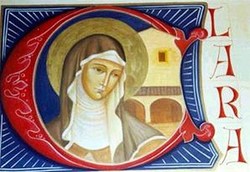 This day a brilliant star rises, for today Saint Clare, the poor handmaid of the Lord, is glorified in heaven.
This day a brilliant star rises, for today Saint Clare, the poor handmaid of the Lord, is glorified in heaven.
Lord, we recall the memory of Saint Clare the virgin. Through her merits, and following her example, may we be strengthened in our hope and charity as we await the glorious resurrection and the enjoyment of eternal communion with you.
Let me take the opportunity to promote the Capuchin Poor Clare vocation…something good happening here.
The hard work of being a person of peace
The Benedictine ideal of the human being is not that
of one who achieves and accomplishes things, not a person with an unusual
religious gift, not a great ascetic, but the wise and mature person who knows
how to bring people together, who creates around herself or himself an
atmosphere of peace and mutual understanding.
high demand. No one can simply resolve to become a peacemaker. Only those who
have created peace within themselves can make peace, only those who have become
reconciled with themselves, their own weaknesses and faults, their needs and
desires, their contradictory tendencies and ambitions.
program of action that one could write on one’s banners; rather, it must arise
from inner peace. And inner peace is achieved only through a hard and
unremitting struggle for inner purity and through prayer, in which one seeks to
accept everything God presents, whether one’s own weaknesses or those of
others.
Saint Matthew, the evangelist
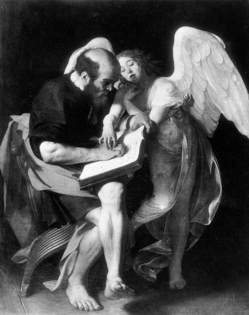 We beseech Thee, O Lord, let the prayers of blessed Matthew, Thine Apostle and Evangelist, assist us, that those things which we cannot obtain by ourselves may be granted us by his intercession.
We beseech Thee, O Lord, let the prayers of blessed Matthew, Thine Apostle and Evangelist, assist us, that those things which we cannot obtain by ourselves may be granted us by his intercession.
Confronting what is being proposed: a viewpoint on real education
This past summer some members of Communion and
Liberation gathered for the second time to discuss important educational
matters at a conference which met in Cambridge, MA. The 2009 theme of the Education Conference was “The Risk of Educating:
The Student-Teacher Relationship.”
talks about this need to live this question, “To educate means to propose
something. But it would mean to
dump something on someone externally, if it were not the proposal of a response
to the question that you live. If
you don’t live the question, the response you propose is fake” (Chris Bacich, read
more of the Keynote address)
Mr. Christopher Bacich, a master teacher, a public speaker on education, and
the leader of the lay Catholic movement, Communion and Liberation in the United
States.
Rooted in Jesus Christ (RiJC): an Adult Faith Formation Community
Rooted in Jesus Christ (RiJC) is an Adult Faith
Formation Community whose goal is to offer everyone the opportunity to explore
ways to ratify, strengthen, and renew their knowledge of, and love for, Jesus
Christ. If you are interested in deepening your faith, then we invite you to
join us at one of our Friday night gatherings. RiJC meets at Our Lady of Good
Counsel Church (East 90th Street, NYC, btw 2nd & 3rd Aves). For dates of
the meeting read the flyer here.
Saint Gaetano Catanoso –a saint for the Year of the Priest
Many think that Saint John Vianney is the only canonized
parish priest. Vianney is certainly the most known for his extraordinary life.
And it helps that popes and other notable authors have drawn our attention to
him. But there is another saint who has a persuasive personality who is also a
parish priest and worthy of our attention. In this Year of the Priest it fitting to have yet another intercessor before God. Today the Church celebrates the
liturgical memorial of Saint Gaetano Catanoso.
Pope Benedict XVI canonized him on October 23, 2005. In
the homily of the Mass of Canonization said:
Saint Gaetano
Catanoso was a lover and apostle of the Holy Face of Jesus. “The Holy Face,” he
affirmed, “is my life. He is my strength”. With joyful intuition he joined
this devotion to Eucharistic piety.
He would say: “If we wish to adore the real
Face of Jesus…, we can find it in the divine Eucharist, where with the Body
and Blood of Jesus Christ, the Face of Our Lord is hidden under the white veil
of the Host.”
Daily Mass and frequent adoration of the Sacrament of the Altar
were the soul of his priesthood: with ardent and untiring pastoral charity he
dedicated himself to preaching, catechesis, the ministry of confession, and to
the poor, the sick and the care of priestly vocations. To the Congregation of
the Daughters of Saint Veronica, Missionaries of the Holy Face, which he founded,
he transmitted the spirit of charity, humility and sacrifice which enlivened
his entire life.
More of Saint Gaetano can be read here.
The American cousin of the saint has a book on Saint Gaetano Catanoso, see it at this link.
Fires of Faith: Catholic England under Mary Tudor: Eamon Duffy strikes again
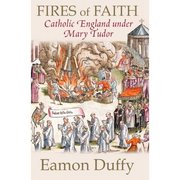 Stuart Chessman, the blogger at The Society of St. Hugh of Cluny recently gave his musings of Eamon Duffy’s newest work, Fires of faith: Catholic England under Mary Tudor (New Haven: Yale University Press, 2009).
Stuart Chessman, the blogger at The Society of St. Hugh of Cluny recently gave his musings of Eamon Duffy’s newest work, Fires of faith: Catholic England under Mary Tudor (New Haven: Yale University Press, 2009).
Saint Francis Mary of Camporosso
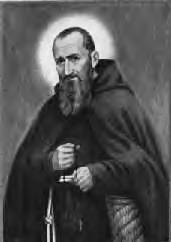 Lavishly he gave to the poor; his generosity shall endure forever.
Lavishly he gave to the poor; his generosity shall endure forever.
